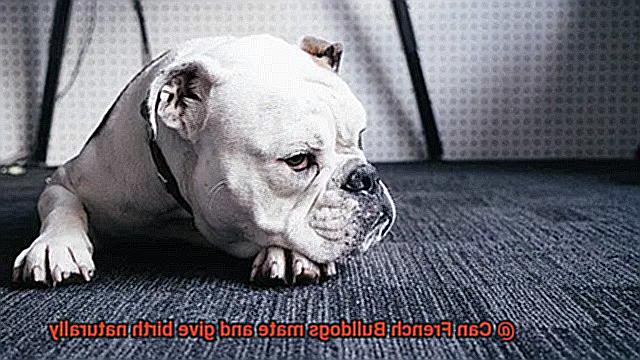Can French Bulldogs mate and give birth naturally?
Today, we’re diving into a topic that has sparked curiosity in the world of canine breeding: Can French Bulldogs mate and give birth naturally? We all know these little squishy-faced cuties have stolen our hearts with their adorable looks and loving nature.
But what about their ability to reproduce on their own? Well, buckle up because we’re about to embark on a journey through the fascinating world of French Bulldog reproduction.
So if you’re itching to uncover the secrets behind this breed’s baby-making abilities, keep reading – it’s time to satisfy your curious mind.
What is Brachycephaly and how does it Affect French Bulldogs?
Contents
- 1 What is Brachycephaly and how does it Affect French Bulldogs?
- 2 Challenges of Natural Mating for French Bulldogs
- 3 Birthing Complications in Female French Bulldogs
- 4 The Importance of Consulting a Veterinarian
- 5 Responsible Breeding Practices for French Bulldogs
- 6 Can Artificial Insemination Help with Mating?
- 7 Is Cesarean Section Necessary for Safe Delivery?
- 8 Conclusion
French Bulldogs are undeniably adorable, with their distinctive pushed-in noses and compact bodies. However, beneath their charming appearance lies a hidden truth – the impact of brachycephaly on their overall health and well-being. In this article, we will delve into the world of brachycephaly and its effects on French Bulldogs, shedding light on the respiratory difficulties, eye problems, and heat sensitivity that plague these beloved dogs.
The Toll on Breathing:
Brachycephalic breeds like French Bulldogs often struggle with breathing due to their shortened skull shape. Their compressed nasal passages and elongated soft palate make it challenging for them to inhale and exhale properly. As a result, you may notice your furry friend constantly snorting or snoring. In severe cases, they might experience labored breathing and even develop respiratory distress under strenuous activity or in hot weather.
Ocular Challenges:
The shortened skull shape of French Bulldogs can also lead to eye problems. The overcrowding of structures within their heads puts pressure on their eyes, making them prone to proptosis (bulging eyes) and corneal ulcers. These issues can cause discomfort, pain, and even loss of vision for our four-legged friends.
Heat Sensitivity:
Regulating body temperature is a challenge for brachycephalic breeds like French Bulldogs. Their compromised respiratory system makes them more susceptible to overheating, which can quickly escalate into life-threatening heatstroke. Owners must be vigilant in providing a cool and comfortable environment for their furry companions, especially during hot weather or strenuous activities.
Exercise Limitations:
Due to their respiratory difficulties, French Bulldogs often have reduced exercise tolerance compared to non-brachycephalic breeds. They may struggle to keep up with high-energy activities or extended periods of exercise. It’s important to monitor your French Bulldog’s exertion levels and ensure they don’t overexert themselves, as it can exacerbate their breathing difficulties.
Brachycephaly is an inherent characteristic of French Bulldogs that significantly impacts their quality of life. From respiratory challenges to eye problems and heat sensitivity, these dogs require extra care and attention.
As responsible owners, it is our duty to educate ourselves about the potential health risks associated with brachycephaly and take proactive measures to safeguard the well-being of our beloved French Bulldogs.
Challenges of Natural Mating for French Bulldogs
For French Bulldogs, finding love and starting a family can be a tad more complicated. These adorable brachycephalic pooches face a unique set of challenges when it comes to natural mating. So, let’s take a closer look at what makes the birds and the bees a bit trickier for our French Bulldog friends.
- The Snout Dilemma: Picture this – a male French Bulldog, ready to woo his lady love. But alas, his short and flat skull poses a problem. With limited range of motion in their snouts, these fellas may struggle to achieve the proper positioning for successful mating. It’s like trying to do the limbo with a stiff neck – not an easy task.
- The Narrow Path: Now let’s turn our attention to the ladies. Female French Bulldogs often face another challenge – narrow birth canals. This can make it difficult for the male to penetrate during mating. It’s like trying to thread a needle with boxing gloves on. And let’s not forget their petite size, which can make carrying and delivering puppies naturally quite challenging.
- Breathing Battles: Breathing easy is not always a breeze for French Bulldogs. They are prone to respiratory problems like brachycephalic airway syndrome, which affects their ability to breathe properly. Imagine trying to get your groove on while struggling for breath – not exactly the recipe for romance.
- Stubborn Sweethearts: French Bulldogs are known for their stubborn streaks, and this can pose its own set of challenges during mating. Some individuals may simply refuse to cooperate or show any interest in getting down and dirty. Talk about a mood killer.
- Fertility Follies: When it comes to fertility, French Bulldogs don’t always hit the jackpot. Compared to other breeds, they have a relatively low fertility rate. So, even if they manage to successfully mate, there’s no guarantee that pregnancy will occur. Breeders may need to roll the dice and invest more time and effort into breeding attempts or consider artificial insemination methods.
- Birth Blues: Finally, there’s the birthing process to consider. With their narrow birth canals and small size, French Bulldogs face a higher risk of complications during childbirth. It’s like trying to squeeze a watermelon through a keyhole. This increases the likelihood of needing veterinary intervention, such as cesarean sections, to ensure the health and safety of both mom and pups.
In conclusion, natural mating for French Bulldogs isn’t all sunshine and rainbows. Their physical characteristics, potential health issues, stubborn temperament, low fertility rate, and risk of complications during childbirth all add up to a challenging journey in the quest for love and puppies. Breeders must arm themselves with knowledge and consult with experts to navigate these obstacles successfully.

Birthing Complications in Female French Bulldogs
If you’re considering breeding your furry friend or if you’re just curious about the unique challenges faced by these lovable pups during childbirth, you’ve come to the right place. In this article, we’ll dive into the common birthing complications experienced by female French Bulldogs and provide expert advice on how to navigate these obstacles like a pro. So, grab a cup of café au lait and let’s get started.
Dystocia: The Battle of the Bulge
Dystocia, or difficulty giving birth, is a common challenge faced by female French Bulldogs. Their petite size and adorable large heads can sometimes create a tight squeeze for those precious puppies. If your Frenchie is struggling to push out the pups or if her pelvis seems too narrow, it’s crucial to seek veterinary assistance immediately to avoid potential life-threatening situations.
Uterine Inertia: When Contractions Need a Little Kickstart
Sometimes, our Frenchies may experience weak or ineffective contractions during labor, a condition known as uterine inertia. Fear not. Your vet can administer oxytocin, a little magic potion that stimulates stronger contractions and helps move things along smoothly.
Small Litter Sizes: Quality Over Quantity
Unlike some other breeds, French Bulldogs usually have smaller litter sizes (around three to four puppies on average). While it may seem disappointing at first, remember that quality outweighs quantity in this case. Smaller litters mean healthier puppies with more room to grow and thrive.
C-Sections: The Superhero of Safe Deliveries
With their adorable squished faces and unique anatomy, French Bulldogs are more prone to needing cesarean sections (C-sections) than other breeds. Don’t worry; this is not a sign of weakness but rather an act of love for the safety of both the mother and her puppies. So, embrace the superhero status and trust your vet’s recommendation.
The Importance of Consulting a Veterinarian
Breeding these adorable and unique pups can be an exciting and rewarding experience. However, it’s crucial to remember that the process comes with its own set of challenges and risks.
That’s why consulting a veterinarian is essential to ensure the health and well-being of both the parents and their future offspring.
In this article, we’ll explore why veterinary guidance is vital when breeding French Bulldogs.
Expert Knowledge for Successful Mating:
French Bulldogs have a distinct anatomy, including a short muzzle and a flat face, which can complicate natural mating. Consulting a veterinarian will provide valuable advice on the best practices for successful breeding, ensuring a safe and efficient mating process.
Genetic Testing and Screening:
To produce healthy puppies, it’s crucial to assess the health and suitability of the breeding pair. Veterinarians can recommend genetic testing and screening to identify any existing health issues or genetic conditions that may affect the breeding process or the puppies’ health.
Prenatal Care and Monitoring:
Throughout the pregnancy, regular check-ups with a veterinarian are essential to monitor the dam’s health, detect any potential complications, and ensure proper nutrition and care for both mother and puppies. Veterinary guidance on prenatal care, vaccinations, dietary requirements, exercise restrictions, and potential signs of complications is vital.
Emergency Interventions:
French Bulldogs have a higher incidence of dystocia (difficult or obstructed labor), which can be life-threatening for both the mother and puppies. Veterinarians can provide necessary assistance during labor and delivery, including emergency interventions like cesarean sections if needed.
Overall Well-being:
Ultimately, consulting a veterinarian throughout the entire breeding process ensures the well-being of the dogs involved. Their expertise reduces risks, increases the chances of successful mating and safe birthing experiences, and potentially saves lives.
Responsible Breeding Practices for French Bulldogs
Breeding French Bulldogs is an exhilarating journey, but it’s crucial to navigate the challenges responsibly. This article explores the key practices that ensure the health and well-being of both parent dogs and their adorable offspring.
By seeking veterinary guidance, you’ll have a trusted compass to steer you towards successful breeding experiences. So, grab your captain’s hat and let’s set sail.
Selecting Healthy Breeding Pairs:
- Conduct thorough health screenings to identify potential genetic issues.
- Test for common conditions like hip dysplasia, patellar luxation, and cardiac abnormalities.
- Breed only dogs free of significant health problems to minimize genetic disorders.
Ensuring Optimal Physical Condition:
- Maintain a healthy weight for the female dog through proper nutrition and regular exercise.
- Overweight females may face difficulties during pregnancy and labor.
Assisting the Mating Process:
- Natural breeding is preferred, but some French Bulldogs may require assistance or artificial insemination.
- Consult a veterinarian experienced in reproductive medicine for safe and successful breeding.
Preparing for Labor and Delivery:
- French Bulldogs often require assistance due to their unique anatomy.
- Be prepared for dystocia (difficult labor) and have a veterinarian on standby for emergency C-sections.
Providing Care during Pregnancy and After Delivery:
- Regular veterinary check-ups ensure the mother’s well-being and detect potential problems.
- Offer a nutritious diet, a stress-free environment, and seek veterinary assistance if needed.
Can Artificial Insemination Help with Mating?
If you’re considering breeding your precious pooches, you may have heard whispers about artificial insemination. But is it really a helpful tool in the world of Frenchie romance? Let’s set sail on this topic and explore the benefits and considerations of using artificial insemination for your French Bulldog’s mating journey.
Smooth Sailing Past Physical Challenges
French Bulldogs are undeniably adorable, but their compact size and unique body structure can sometimes create obstacles during the mating process. Natural mating may prove difficult or even impossible due to these physical characteristics. That’s where artificial insemination swoops in to save the day. With this technique, breeders can bypass these challenges and ensure a smoother voyage for their furry friends.
Avoiding Stormy Health Conditions
French Bulldogs are notorious for their respiratory problems and heat intolerance. These health conditions can make it risky for them to engage in vigorous physical activity, including natural mating. But fear not, mateys. Artificial insemination provides a safer alternative that keeps your Frenchies’ health in check while still allowing them to experience the joy of parenthood.
Broadening Your Breeding Horizons
Arr matey, here’s another treasure hidden within artificial insemination: it allows breeders to overcome geographical limitations. With chilled or frozen semen, you can access quality genetic material from male dogs located in faraway lands. This expands your breeding options and enhances genetic diversity, resulting in healthier and happier French Bulldog litters.
Timing is Everything
In the world of breeding, timing is everything. And with artificial insemination, you have better control over the timing of breeding. You can accurately predict when your female Frenchie is most fertile and inseminate her accordingly. This precision increases the chances of a successful mating and a bountiful litter of adorable pups.
Charting the Course for Success
While artificial insemination can be a valuable tool in your breeding arsenal, it’s important to remember that it doesn’t guarantee pregnancy. Factors like semen quality, timing of insemination, and the overall health of the female dog still play crucial roles in determining success. To ensure smooth sailing, consult with a veterinarian who specializes in reproduction. They’ll help you navigate the waters of artificial insemination and increase your chances of a successful mating.
Is Cesarean Section Necessary for Safe Delivery?
French Bulldogs are a beloved breed known for their unique charm and distinctive appearance. However, their adorable features can sometimes present challenges during childbirth. In this article, we will explore why French Bulldogs often require a Cesarean section for safe delivery and provide insights based on research and first-hand experiences.
Understanding the Anatomy:
French Bulldogs are characterized by their large heads and narrow pelvises, which can make natural delivery problematic. The puppies’ size and positioning can create complications during labor, leading to a higher incidence of dystocia, or difficult labor.
Research Findings:
Studies have shown that the rate of Cesarean sections in French Bulldogs is significantly higher compared to other dog breeds. A study specifically conducted on French Bulldogs found that only 35% of them were able to deliver their puppies naturally, while the remaining 65% required a Cesarean section.
Reasons for Cesarean Section Requirement:
The most common reason for a Cesarean section in French Bulldogs is dystocia. This condition can result from puppies being too large to pass through the birth canal or from malpositioning or malpresentation of the puppies. In such cases, a Cesarean section becomes necessary to ensure the safe delivery of both the mother and her puppies.
Consulting a Veterinarian:
While not all French Bulldogs will require a Cesarean section, consulting with a veterinarian who specializes in reproductive health is crucial. These experts can assess the individual dog’s anatomy and provide guidance on the safest approach for delivery.
Risks and Considerations:
Cesarean sections are generally safe procedures performed in veterinary medicine. However, as with any surgery, there are potential risks and complications to be aware of, such as infection, hemorrhage, anesthetic complications, and delayed maternal bonding with the puppies. It is important to discuss these considerations with your veterinarian to make an informed decision.
LcoHjTPedek” >
Conclusion
In conclusion, the mating and birthing process for French Bulldogs is not without its challenges. Their distinctive brachycephalic features, such as their short snouts and narrow birth canals, can make natural reproduction a difficult and even risky endeavor for both the mother and her puppies. These adorable pooches face a range of issues including breathing difficulties, eye problems, heat sensitivity, limited exercise capabilities, and low fertility rates.
While it is not impossible for French Bulldogs to mate naturally, it often necessitates assistance or artificial insemination. Breeders must be prepared for potential obstacles during the mating process and understand the risks associated with natural birth. Cesarean sections are frequently required to ensure the safe delivery of puppies due to dystocia.
Throughout the breeding journey, consulting with a veterinarian who specializes in reproductive health is paramount. They can offer expert guidance on genetic testing and screening, prenatal care, pregnancy monitoring, emergency interventions during labor, and overall well-being of the parent dogs.
Responsible breeding practices involve carefully selecting healthy breeding pairs, ensuring optimal physical condition, assisting with mating if necessary, preparing for labor complications like dystocia or uterine inertia, providing proper care during pregnancy and postpartum.
Artificial insemination serves as a valuable tool in overcoming physical challenges and expanding breeding options. It allows breeders to circumvent difficulties related to natural mating while still achieving successful pregnancies. However, it’s important to remember that artificial insemination does not guarantee pregnancy.
Ultimately, responsible breeding practices combined with veterinary guidance are essential in safeguarding the health and well-being of French Bulldogs throughout the mating and birthing process.




